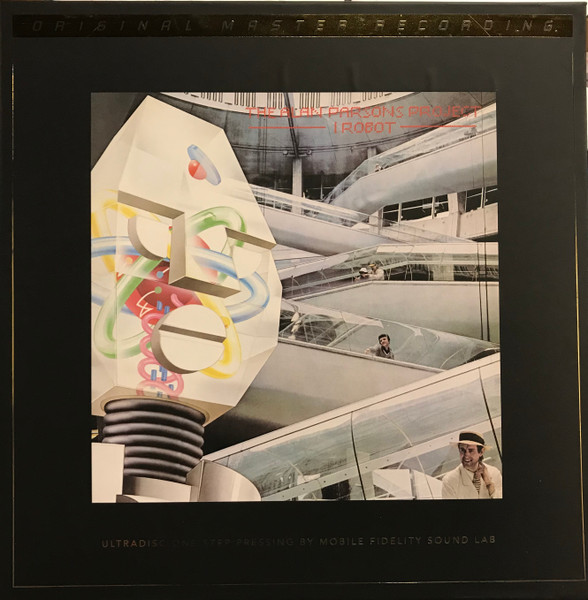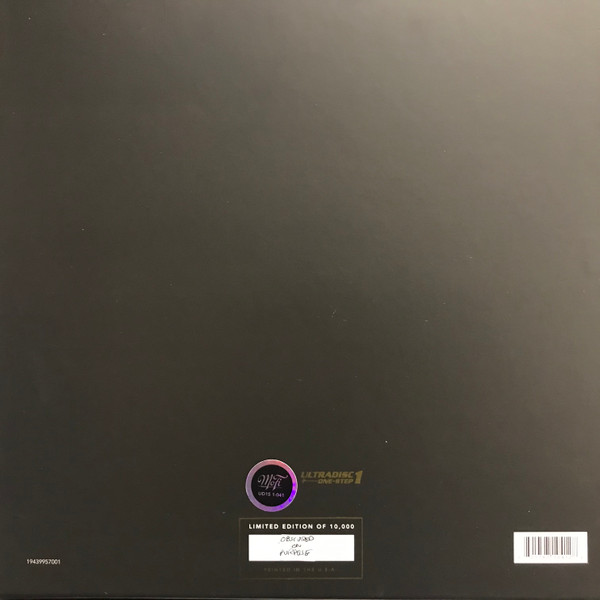

| Product Code: | UDIS 1041 |
| Artist: | Alan Parsons Project |
| Origin: | USA |
| Label: | Mobile Fidelity Sound Lab (2022) |
| Format: | 12", 45 RPM, Limited Edition, Numbered |
| Availability: | Enquire Now |
| Condition: |
Cover: M
Record: M
|
| Genre: | Prog Rock , Rock N |
LP, Album, Limited Edition, Numbered, Reissue, Remastered, Stereo, 180g SuperVinyl, Slipcase
Mastered from the original master tapes, pressed at RTI on MoFi SuperVinyl, and afforded the luxurious groove space of 45RPM LPs, I Robot comes to life like never before on this numbered, limited-edition reissue. Boasting a nearly undetectable noise floor, immaculate highs and lows, generous spaciousness, and see-through transparency that takes you into the studio with Parsons and creative partner Eric Woolfson at Abbey Road, this definitive edition is designed to demonstrate the full-range capabilities of the world's best stereo systems.
Put simply, there's more music, more information, more detail, more nuance, more of everything you want. Mobile Fidelity's transcendent UD1S 45RPM edition invites you to savor reference-grade soundstages, immersive smoothness, sought-after instrumental separation, three-dimensional imaging, and consummate tonal balances. Able to be played back at high volumes without compromise or fatigue, these LPs are demonstration records for the ages—the likes of which are no longer being made. This is the very reason you own and invest in high-end audio gear.
The beautiful presentation of the numbered, limited-edition UD1S I Robot pressing speaks to the music's merit. Housed in a deluxe box, the reissue features special foil-stamped jackets and faithful-to-the-original graphics. Aurally and visually, it is made for discerning listeners who prize sound quality and production, and who desire to fully immerse themselves in everything about this conceptual landmark. Parsons' most iconic record deserves nothing less.
Inspired by and loosely based around the Isaac Asimov stories of the same name, I Robot delves into themes of artificial intelligence and technological dominance that make the record extremely relevant in the 21st century. Indeed, Parsons' pinnacle creation dovetailed with the ascendency of Star Wars, which itself is experiencing a rebirth in an age of self-driving cars, smart devices, and mindless automation. Lyrically, songs such as "The Voice" call into question human behavior—and their relationship to increasing robotic supremacy—in everyday life. Parsons musically reflects the associated paranoia, dichotomy, and transformation via shifting sci-fi arrangements steeped in drama and moodiness.
The absorbing tunes on I Robot also continue to fascinate due to their perfectionism and innovation. Borrowing from Pink Floyd's strategies, Parsons utilizes a looped sequence on the title track to create new downbeats. "Some Other Time" employs two different lead vocalists and yet gives the illusion that only one is involved. Captivating strings, a piccolo trumpet, and bona fide pipe organ grace "Don't Let It Show." The origins of "Nucleus" stem from a unique analog keyboard concoction dubbed "the Projectron," devised by Parsons and electronic engineer Keith Johnson. Andrew Powell's orchestral and choral arrangements top it all off, with "Total Eclipse" arriving as a frightening track that presages the climactic "Genesis Ch. 1 V. 32."
Mobile Fidelity Sound Lab's UltraDisc One-Step (UD1S) technique bypasses generational losses inherent to the traditional three-step plating process by removing two steps: the production of father and mother plates, which are created to yield numerous stampers from each lacquer that is cut. For UD1S plating, stampers (also called "converts") are made directly from the lacquers. Since each lacquer yields only one stamper, multiple lacquers need to be cut. Mobile Fidelity's UD1S process produces a final LP with the lowest-possible noise floor. The removal of two steps of the plating process also reveals musical details and dynamics that would otherwise be lost due to the standard multi-step process. With UD1S, every aspect of vinyl production is optimized to produce the best-sounding vinyl album available today.
Developed by NEOTECH and RTI, MoFi SuperVinyl is the most exacting-to-specification vinyl compound ever devised. Analog lovers have never seen (or heard) anything like it. Extraordinarily expensive and extremely painstaking to produce, the special proprietary compound addresses two specific areas of improvement: noise floor reduction and enhanced groove definition. The vinyl composition features a new carbonless dye (hold the disc up to the light and see) and produces the world's quietest surfaces. This high-definition formula also allows for the creation of cleaner grooves that are indistinguishable from the original lacquer. MoFi SuperVinyl provides the closest approximation of what the label's engineers hear in the mastering lab.